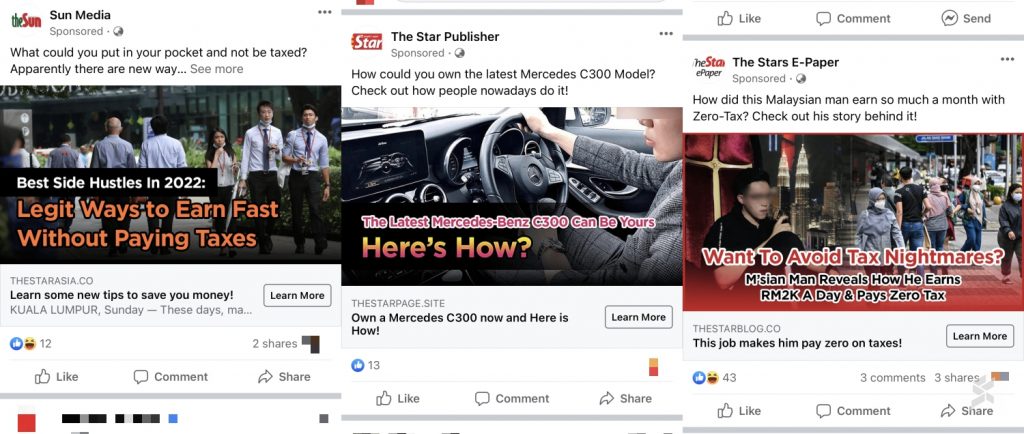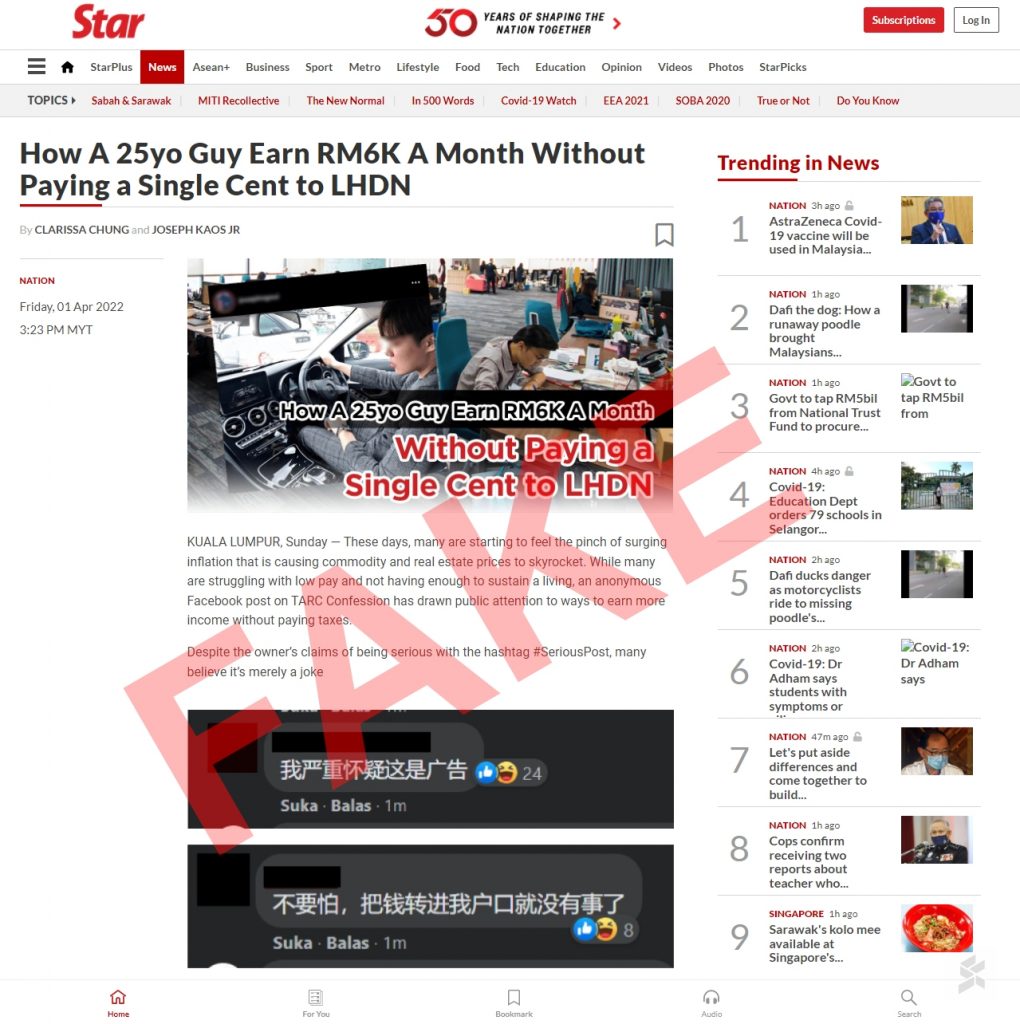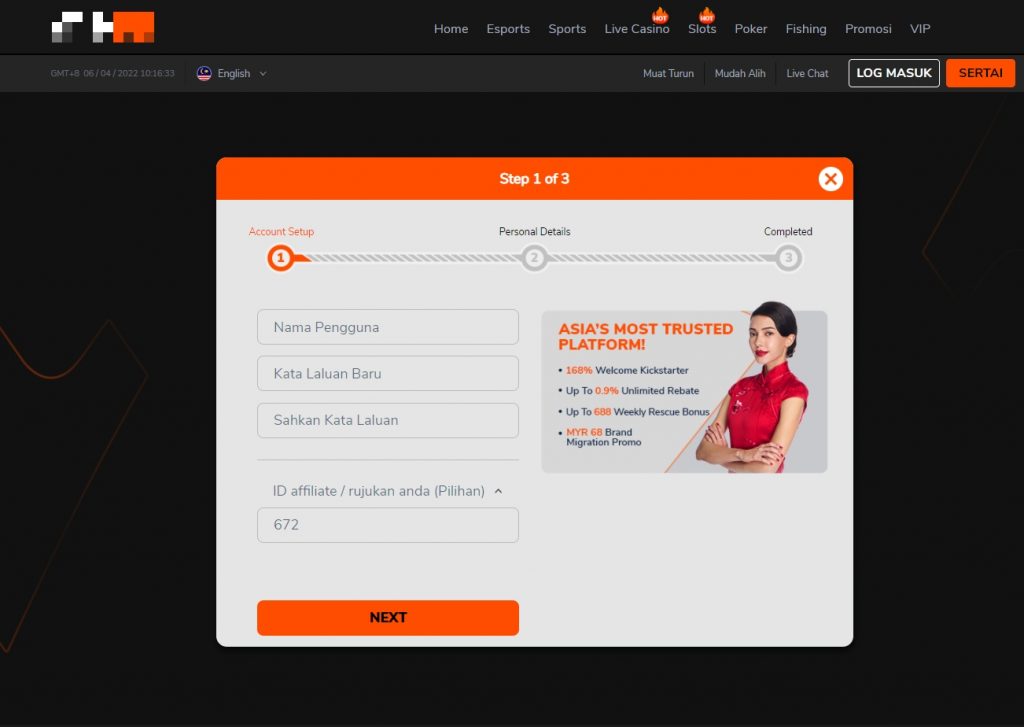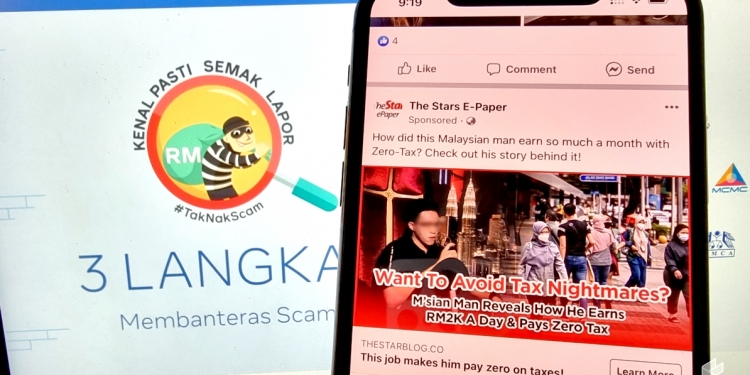It’s 2022 and Facebook is still allowing scammers to use its platform to target Malaysians. Just this week alone, we’ve spotted several Facebook Sponsored ads pretending to be mainstream media sites like The Sun and The Star to lure victims.
Facebook ads pretending to be The Star and The Sun Daily

Most of these ads are typically finance or money-related promising high earnings, promoting ways to own a luxury car and making money without paying taxes. The ads use logos and names of mainstream media to make them look more legitimate. It is only if you look at the URL, that you’ll know that these are fake sites as it uses alternative variations of thestar.com.my.

If you click on the ads, you’ll be directed to a page that looks identical to The Star but with a different headline and content to draw the user. However, if you click on any links, you will be directed to a gambling-looking website asking you to sign up for an account. These ads are downright misleading and it is a violation of Facebook’s own advertising policy. Similar to the KFC Voucher scam ads that have been operating years ago, these ads were launched from a recently created Facebook page with very few followers.

How could Facebook allow such ads to run?
All ads on Facebook would have to go through an ad review process to ensure that it does not violate their advertising policy. This is to ensure that the ads clearly represent the company, product, service or brand that’s being advertised. Depending on the situation, an ad may take hours or days to get approved.
Similar to the KFC scam ads reported previously, these scam campaigns were launched using newly created Facebook pages with very few followers. That should have raised red flags to Facebook’s advertising team to inspect the account further. With repeated occurrences like this, Facebook should have stepped up its checks to prevent false and misleading ads from its platform, which could lead to severe losses for its users.
Facebook has launched several anti-misinformation and anti-scam campaigns to help develop digital literacy among Malaysians. One of such campaigns is #TakNakScam in partnership with the Royal Malaysian Police, the Malaysian Communications and Multimedia Commission and various ministries and government agencies.
However, it is clear that Facebook isn’t doing enough to curb preventable scam activities on its platform. Last month, the Australian Competition and Consumer Commission (ACCC) has sued Meta for failing to prevent scammers from using its Facebook platform to promote fake ads on cryptocurrency or money-making schemes. The lawsuit alleges Facebook “aided and abetted or was knowingly concerned in false or misleading conduct and representations by the advertisers.”
ACCC Chair Rod Sims said, “Meta should have been doing more to detect and then remove false or misleading ads on Facebook, to prevent consumers from falling victim to ruthless scammers.”
“Apart from resulting in untold losses to consumers, these ads also damage the reputation of the public figures falsely associated with the ads. Meta failed to take sufficient steps to stop fake ads featuring public figures, even after those public figures reported to Meta that their name and image were being featured in celebrity endorsement cryptocurrency scam ads,” he added. The ACCC reported a consumer had lost more than AUD 650,000 (about RM2 million) due to one of the scams falsely advertised as an investment opportunity on Facebook.
Recently, Malaysia’s Federal Commercial Crime Investigation Department (CCID) director Comm Datuk Mohd Kamarudin Md Din warned of a new tactic by scammers that used Facebook and WhatsApp to steal money from their victims. They would advertise items for sale and direct victims to contact them via WhatsApp, where they will give them a dodgy APK file to download. The syndicate uses the APK file to steal online banking credentials from the user.
Besides Facebook, Google is also having the same issue. It was reported that crypto scammers have stolen over USD 500,000 (over RM2.1 million) using Google Ads and phishing websites. Apple co-founder Steve Wozniak had also sued YouTube and Google for allowing bitcoin giveaway scams using his identity.
Related reading
- Scammers are using Facebook and dodgy APK files to steal your money. Here’s what Maybank wants you to do
- PSA: Beware of fake KFC Malaysia Facebook pages offering free vouchers
- Steve Wozniak is suing YouTube due to bitcoin giveaway scams
- How did a “bug” on Facebook lead to increased views of harmful content over the last six months?







